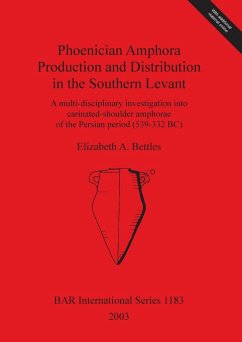The primary aim of this monograph is to use one commodity type, the carinated-shoulder amphora, to investigate the level of centralisation and modes of production and distribution in southern Phoenicia (i.e. the city-states of Tyre and Sidon) when the region was under Persian (Achaemenid) imperial hegemony (539-332 BC). The second is to set the research findings into a broader socio-cultural context, viewing the amphorae as containers of wine, and the impact on the production and distribution of these amphorae as Persian imperial attitudes towards, and patterns of consumption of, wine. To determine whether these amphorae may be of southern Phoenician manufacture the author analyses petrographically the fabric of 307 amphorae gathered from 21 sites in thecoastal areas of southern Lebanon and Israel, and assesses to what extent the raw materials in the fabrics may be consistent with the geological formations in this region. She goes on to present a typology of carinated-shoulder amphorae of proposed southern Phoenician manufacture using an innovative technique, the 'envelope' method. This technique produces a typology which is repeatable and verifiable. An intra-regional analysis of the manufacture of these amphorae is conducted, assessing through the application of theoretical models to what extent production was centralised at this period. The study examines data which indicates the presence on a particularly significant amphora manufacturing centre in the region, and then attempts to identify the mechanism whereby amphorae were dispersed throughout the region, whether it was attached, independent, or whether both mechanisms could have existed simultaneously. Again, by applying theoretical models, the author attempts to determine to what degree amphora distribution was regionally integrated, and whether nodes of distribution existed which facilitated their dispersal. Finally, the work investigates from epigraphic and documentary sources, the role of wine in Persian culture, the quantities in which it was consumed and the wine preferences of the Persian elite, exploring what impact these factors may have had on the production and distribution of carinated-shoulder amphorae.
Hinweis: Dieser Artikel kann nur an eine deutsche Lieferadresse ausgeliefert werden.
Hinweis: Dieser Artikel kann nur an eine deutsche Lieferadresse ausgeliefert werden.








